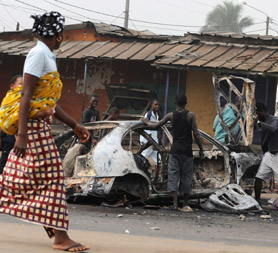Thousands flee Ivory Coast violence
Ongoing violence in the Ivory Coast, following the disputed election at the end of last year, has seen 20,000 flee across the border to Liberia. Jane Deith hears their stories of violence and abuse.

At least five people were killed on Wednesday in the Ivory Coast capital, Abidjan, in a second day of fighting over the election outcome.
Incumbent leader, Laurent Gbagbo, is internationally seen as having lost the election held in November last year to rival Alassane Ouattara – and now violent clashes between supporters of both sides have broken out on the streets. Police and paramilitaries have been deployed to scenes of fighting, and gunshots were heard throughout the night.
So far, 200 have died in clashes since November, and the United Nations says many among the dead were killed by pro-Mr Gbagbo security forces – he retains control of the military and the police – or allied militias in regular night time raids on neighbourhoods, like Abobo, that are seen as pro-Mr Ouattara. Hundreds of other people may have been abducted and taken to secret detention centres, UN officials fear.
But Mr Gbagbo denies killings and kidnappings, and says many police have been killed by armed activists supporting Mr Ouattara.
As both Presidential rivals refuse to back down, thousands of people who fear the return of civil war to the Ivory Coast have already fled, as charities warn of an impending humanitarian crisis.The country only achieved a fragile peace after the last major outbreak of violence just eight years ago.
Channel 4 News reporter Jane Deith travelled to the border between the Ivory Coast and neighbouring Liberia, to hear the shocking stories of refugees who tell her they will not wait around for war to hit again.
Kanu Manwako said he saw government soldiers kill a man, for voting for a new leader. As soldiers prepared to kill another man, they yelled at him: “Run old man”.
From the next village along, and now encamped at the border, Oli Bernard says he was flogged on election day as he was counting the votes. Anti-Government rebels demanded he fix the result, and when he said no, they attacked him.
They stripped me naked and they flogged me. So that night, I fled. Oli Bernard
“They stripped me naked and they flogged me – they really beat me,” he said.
“So that night, before midnight, I fled. I got my family together, and we fled.”
Rebecca Dumbie said she was beaten too, by four men who looted her house and then punched her in the stomach for half an hour – because her father voted for President Laurent Gbagbo.
Liberia
Ms Dumbie, like thousands of others, fled her home and walked into a Liberian village asking for help. And, again like thousands of others, she received it – generously.
The Liberians remember their own civil war, which killed 250,000 people – and they also remember how millions more survived because they fled to Ivory Coast. So the Liberians say that in this crisis, what they have, they want to share.
But as thousands more flood into the villages every day amid the threat of increasing violence, and the promised UN aid as yet shows no sign of materialising, the future looks uncertain.